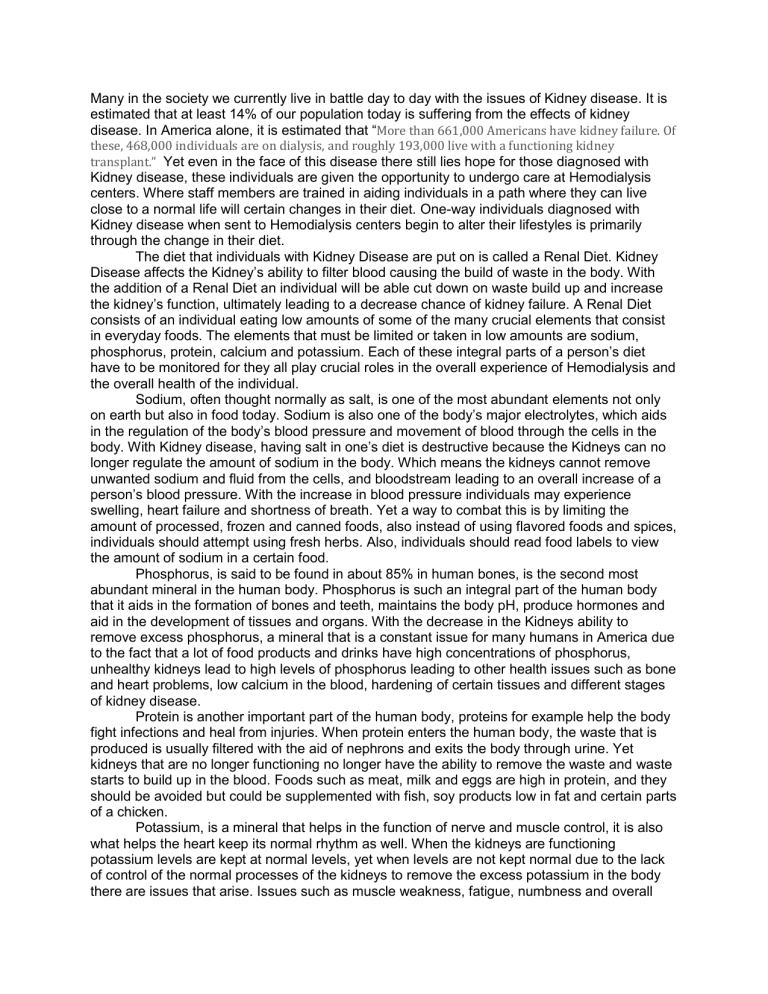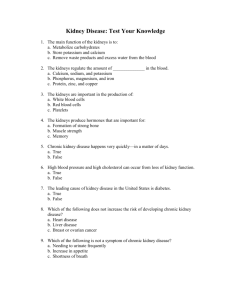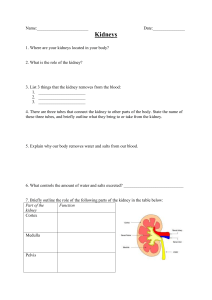
Many in the society we currently live in battle day to day with the issues of Kidney disease. It is estimated that at least 14% of our population today is suffering from the effects of kidney disease. In America alone, it is estimated that “More than 661,000 Americans have kidney failure. Of these, 468,000 individuals are on dialysis, and roughly 193,000 live with a functioning kidney transplant.” Yet even in the face of this disease there still lies hope for those diagnosed with Kidney disease, these individuals are given the opportunity to undergo care at Hemodialysis centers. Where staff members are trained in aiding individuals in a path where they can live close to a normal life will certain changes in their diet. One-way individuals diagnosed with Kidney disease when sent to Hemodialysis centers begin to alter their lifestyles is primarily through the change in their diet. The diet that individuals with Kidney Disease are put on is called a Renal Diet. Kidney Disease affects the Kidney’s ability to filter blood causing the build of waste in the body. With the addition of a Renal Diet an individual will be able cut down on waste build up and increase the kidney’s function, ultimately leading to a decrease chance of kidney failure. A Renal Diet consists of an individual eating low amounts of some of the many crucial elements that consist in everyday foods. The elements that must be limited or taken in low amounts are sodium, phosphorus, protein, calcium and potassium. Each of these integral parts of a person’s diet have to be monitored for they all play crucial roles in the overall experience of Hemodialysis and the overall health of the individual. Sodium, often thought normally as salt, is one of the most abundant elements not only on earth but also in food today. Sodium is also one of the body’s major electrolytes, which aids in the regulation of the body’s blood pressure and movement of blood through the cells in the body. With Kidney disease, having salt in one’s diet is destructive because the Kidneys can no longer regulate the amount of sodium in the body. Which means the kidneys cannot remove unwanted sodium and fluid from the cells, and bloodstream leading to an overall increase of a person’s blood pressure. With the increase in blood pressure individuals may experience swelling, heart failure and shortness of breath. Yet a way to combat this is by limiting the amount of processed, frozen and canned foods, also instead of using flavored foods and spices, individuals should attempt using fresh herbs. Also, individuals should read food labels to view the amount of sodium in a certain food. Phosphorus, is said to be found in about 85% in human bones, is the second most abundant mineral in the human body. Phosphorus is such an integral part of the human body that it aids in the formation of bones and teeth, maintains the body pH, produce hormones and aid in the development of tissues and organs. With the decrease in the Kidneys ability to remove excess phosphorus, a mineral that is a constant issue for many humans in America due to the fact that a lot of food products and drinks have high concentrations of phosphorus, unhealthy kidneys lead to high levels of phosphorus leading to other health issues such as bone and heart problems, low calcium in the blood, hardening of certain tissues and different stages of kidney disease. Protein is another important part of the human body, proteins for example help the body fight infections and heal from injuries. When protein enters the human body, the waste that is produced is usually filtered with the aid of nephrons and exits the body through urine. Yet kidneys that are no longer functioning no longer have the ability to remove the waste and waste starts to build up in the blood. Foods such as meat, milk and eggs are high in protein, and they should be avoided but could be supplemented with fish, soy products low in fat and certain parts of a chicken. Potassium, is a mineral that helps in the function of nerve and muscle control, it is also what helps the heart keep its normal rhythm as well. When the kidneys are functioning potassium levels are kept at normal levels, yet when levels are not kept normal due to the lack of control of the normal processes of the kidneys to remove the excess potassium in the body there are issues that arise. Issues such as muscle weakness, fatigue, numbness and overall weakness. With Kidney disease the ways to prevent potassium levels from affecting an individual's health is by limiting foods that are high in potassium such as milk and milk products, remove the liquids from canned fruits and maintaining the appropriate serving size on many foods. Calcium is said to be the most abundant mineral found in the human body. Nearly most of the calcium in the human body is found in teeth and bones, and the rest is found in tissues and blood. Calcium is integral in forming strong bones and teeth, the contracting and relaxing of muscles, the normal clotting of blood. On a cellular level calcium aids in the process of cell division and cell multiplication as well as aids in enzyme reactions. With Kidney disease there is an imbalance in the body more specifically the bones metabolism leading to an increase chance of bone disease. Even with the possibility of gaining other illnesses, individuals with Kidney disease under a renal diet are advised to eat foods that are low in phosphorus to aid in the keeping the blood level within a proper range, avoiding foods with labels such as “calcium enriched,” “excellent source of calcium,” and “good source of calcium.” The Renal Diet is not a diet that many can view as a temporary alteration of eating habits to effect a specific change, but a diet that requires time, effort and commitment in the hopes of changing their overall health and the ability to extend their lives and happiness. The diagnoses of Kidney Disease is not one that is light but with the aid of trained Hemodialysis centers and their staff, patients are able to obtain a plan and gain patient options that can improve their ability to live with different stages of the disease. Though the Renal Diet requires the limitations of many of the common dietary minerals and elements in the human diet, it is possible for someone to live a long time with Kidney Disease if controlled correctly.






